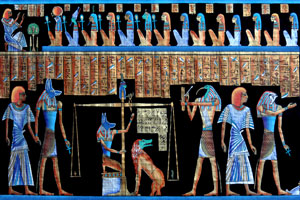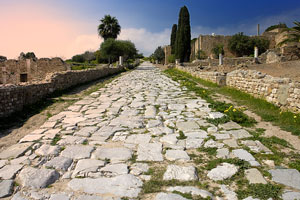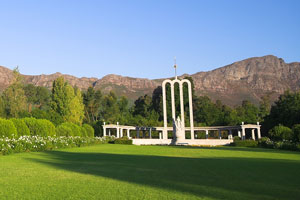
Africa History and Culture
Map of Africa > Africa History | Africa Travel Tips |
Africa Relief Map | Africa Topo Map
 The earliest African people relied on hunting, fishing, and gathering,
until the first African civilization was first developed in Egypt, along
the Nile River. The location of the river, combined with the area's
ability to sustain agriculture, meant that civilization flourished here
for more than 3,000 years.
The earliest African people relied on hunting, fishing, and gathering,
until the first African civilization was first developed in Egypt, along
the Nile River. The location of the river, combined with the area's
ability to sustain agriculture, meant that civilization flourished here
for more than 3,000 years.
Africa was comprised of village-based communities, which in addition to agriculture discovered keeping livestock such as sheep and cattle. Ironworking was introduced to sub-Saharan people in the fourth century, allowing them to make the tools, machinery, and weapons that allowed African civilization to progress.
 The city of Carthage ruled the western Mediterranean until it was
conquered by the Roman Empire in 146 BC. At that point, North
Africa's coastal strip was under the control of Rome and Byzantium until
the Arabs moved in, spreading their language, religion, and culture, in
the seventh century. To this date, Islam has a major influence on
the continent of Africa.
The city of Carthage ruled the western Mediterranean until it was
conquered by the Roman Empire in 146 BC. At that point, North
Africa's coastal strip was under the control of Rome and Byzantium until
the Arabs moved in, spreading their language, religion, and culture, in
the seventh century. To this date, Islam has a major influence on
the continent of Africa.
From 800 to 1600 BC, regional empires rose and fell along the Niger River, where ivory, gold, nuts, and slaves formed the basis for trade. One of the most long-lasting empires was the Benin kingdom, which ruled in the area from the 13th century to the 19th century. In some places, religious leaders also served as kings.
From 900 BC on, people spread to the towns and cities of the east coast, from Somalia to Zanzibar, resulting in the Swahili culture. Today, the language of Swahili remains an important language in east, central, and southern Africa.
As settlements were developed, the people of Africa discovered arts, crafts, and other creative pastimes. Oral narrative was used to preserve history and culture.
 From 1500 AD to about the mid-1990s, Africa was dominated by other
countries that colonized it, including Portugal, Great Britain, Belgium,
France, Italy, and Germany. The influx of these European nations
brought Christianity to the continent. During this time slaves were
shipped to North America, South America, and Arab regions of Africa.
From 1500 AD to about the mid-1990s, Africa was dominated by other
countries that colonized it, including Portugal, Great Britain, Belgium,
France, Italy, and Germany. The influx of these European nations
brought Christianity to the continent. During this time slaves were
shipped to North America, South America, and Arab regions of Africa.
Colonization continued until the end of both World Wars, at which point the countries of Africa began to gain independence. While most countries on the continent were independent by the 1960s, the last country to become independent, Namibia, didn't do so until 1990.
Because of the history of colonization, African culture is a mix of traditional ritual, language, and religion, mixed with European influences. Today many languages are spoken on the continent of Africa, and just about every world religion is represented.
All rights reserved.
Africa Map Africa History & Culture • Africa Travel & Tourism Africa Relief Map • Africa Topographic Map